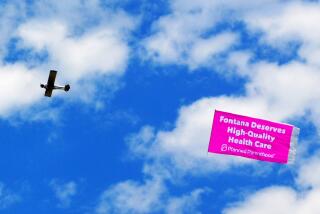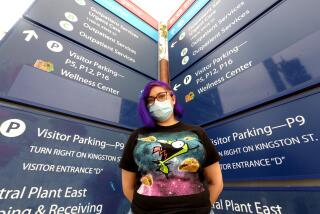The Promise of Campus Clinics
Unlike most of their parents, today’s teen-agers have been thrust into a world of adult choices without the wisdom of age. An alarming number of young people find an easy escape through readily accessible drugs and alcohol. Social pressures lead many girls to diet to the point of starvation. High-school students have become trapped by peer pressure and the perceived social acceptance of sexual promiscuity portrayed in movies and television and sometimes even by parental example. For many, maturity will eventually come. For some, it will be too late. The optimism of youth tells them that they are in control--that bad things happen only to others. But statistics tell us other-wise.
Teen-age drug and alcohol abuse has skyrocketed, anorexic girls are dying, and sexual activity among high-school students, estimated at about 40%, accounts for far too many teen-age pregnancies often complicated by drug abuse, exposure to venereal disease and, now, AIDS. Confronted with such medical crises, most parents turn to the family physician for help. But for countless low-income families private medical help is unaffordable and public-health programs in California have become increasingly unavailable.
Next September, students at three Los Angeles high schools will have free medical clinics on their school campuses, and the school board is unanimously jubilant. The Robert Wood Johnson Foundation has granted a potential $1.8 million to the Los Angeles Unified School District to set up fully staffed medical clinics at Jordan, San Fernando and Los Angeles High Schools. The initial Johnson grant of $600,000, along with private donations and grants from the Brush Foundation and the Stuart Foundation, will fund the clinics for two years.
Similar to health clinics on most university campuses, the high-school clinics will diagnose and treat illness, injuries and medical emergencies. In addition, professional counseling for drug and alcohol abuse, family planning and eating disorders will be available to students who have specific parental consent.
As good as these health-care clinics are, they are not without their critics. Father John Moretta, speaking for the Los Angeles Roman Catholic Archdiocese, believes that the clinics will sanction sexual promiscuity and become abortion-referral services.
This is not true. Each student will be required to have specific parental authorization in order to obtain any type of medical treatment at the on-site campus clinic. In addition, school board member Roberta Weintraub has said that, despite the current state law allowing physicians to perform abortions without parental consent if a girl is over 12 years old, the school board will not permit abortions or abortion referrals at the three high school clinics. Although family planning and pregnancy counseling will be available, students will be required to have specific parental permission for these services.
It would be wrong to deny thousands of high-school students available medical treatment because of these two issues. The school board believes that it has a workable solution in which parents at these three high schools will retain responsibility for their teen-agers’ medical and psychological well-being. We agree. Issues of morality must continue to be the responsibility of the church and the family. If the church, the family and the schools can all work together, teen-agers in these three Los Angeles high schools will have sound minds and sound bodies with which to make a lifetime of intelligent and ethical decisions.
More to Read
Sign up for Essential California
The most important California stories and recommendations in your inbox every morning.
You may occasionally receive promotional content from the Los Angeles Times.










